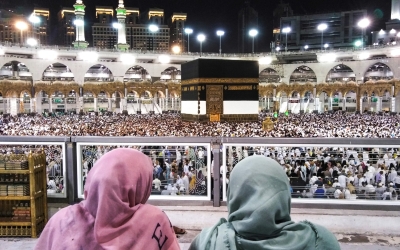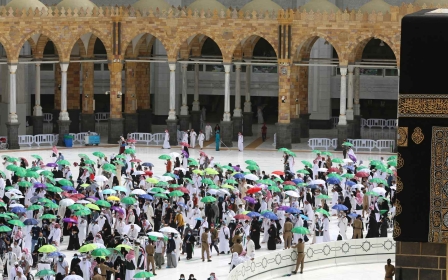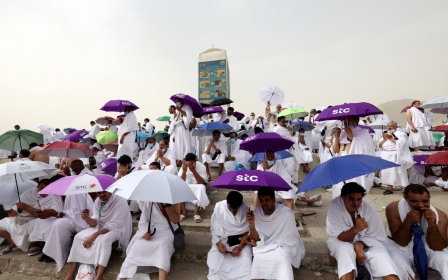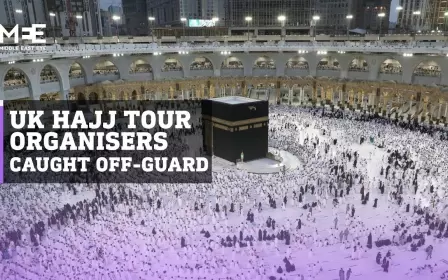Hajj lottery for western pilgrims descends into farce
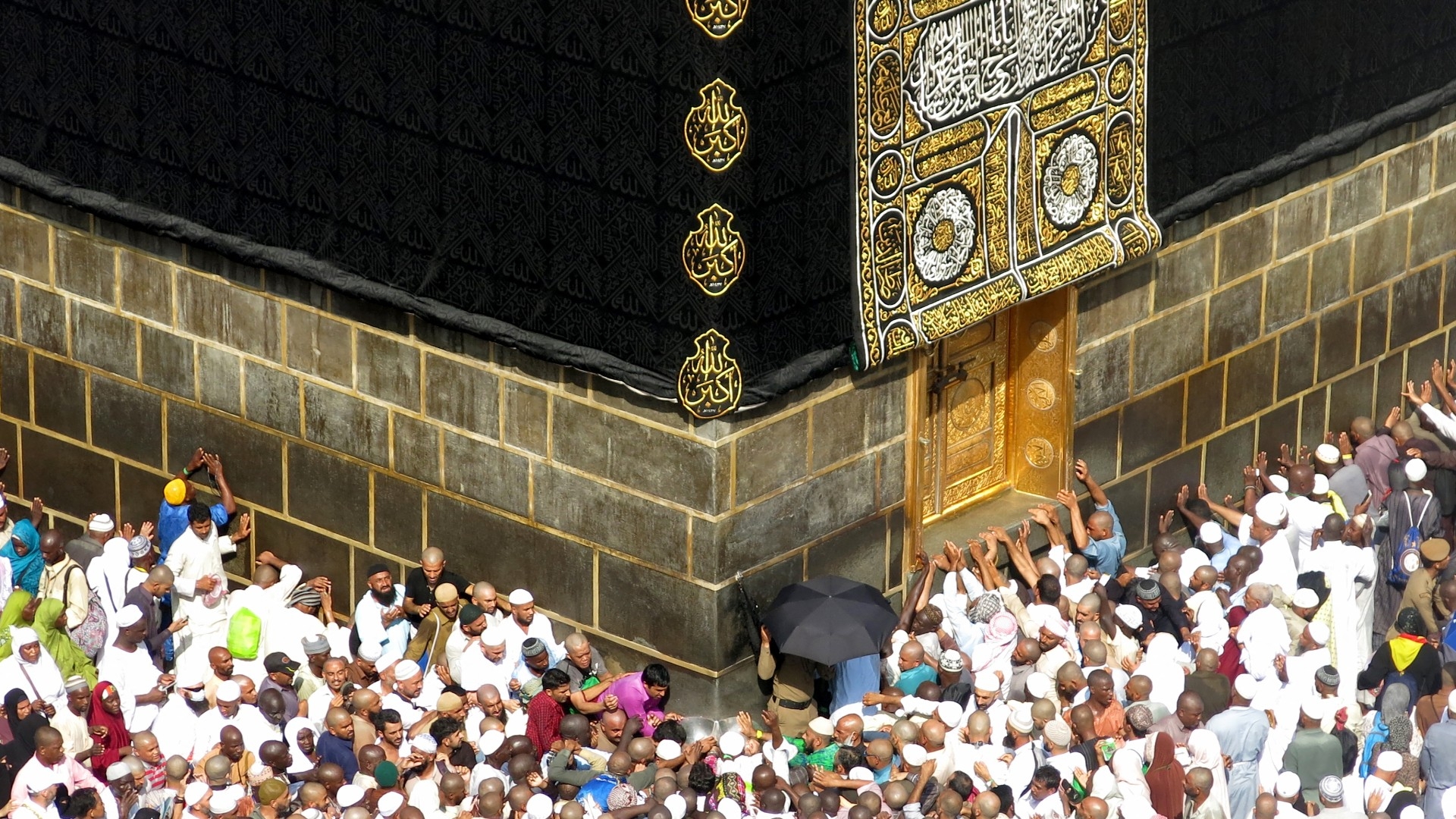
"Labaik Allahuma Labaik" is the prayer that Muslims repeatedly recite during the Hajj pilgrimage, declaring "I respond to Your call O God! I respond to Your call."
Prospective pilgrims from western countries have heard that on repeat over the past few days, but not in Mecca as they wished; rather, it was on the phone while they desperately waited for hours to speak to a staff member at Motawif.
The Saudi Arabia-backed website has organised the random draw that Muslims from Europe, Australia and the Americas must go through to attend Hajj this year, set to start on 7 July.
Since early June, when the Saudi government made the surprise announcement to sideline traditional travel agencies and instead use the platform - which is linked to India's Modi as revealed by Middle East Eye - applicants have complained about the difficulties they have faced at every turn in the process.
The problems, as told by a number of people to MEE, include: not being told the status of their application days after the deadline, payments failing, bookings being cancelled after payments had already been made, tour packages and prices being different to what was advertised and a complete lack of complaints system or accountability.
Booking failures
At the beginning of the draw process 10 days ago, Motawif announced three packages: silver (starting from $5,986), gold (from $6,296) and platinum ($9,768).
All packages were to include flights, accommodation, domestic transportation and catering - with varying lengths of stay and levels of service.
A Birmingham-based Hajj applicant told MEE that he had initially applied for a gold package. But once the application was approved, he was instead offered a more expensive platinum package with no flight, and a hotel that was a 49-minute walk from the Grand Mosque in Mecca.
“I proceeded to pay, fearing I would lose my place for Hajj. After all, I believed I was lucky to be selected,” he said, requesting anonymity like all applicants interviewed by MEE.
The payment went through, but when he checked on Motawif’s website it said that the booking had failed.
A North Carolina-based systems engineer told MEE he faced the same issue: he had paid $16,447 for a platinum package but the booking said “failed” after the transaction had already been processed.
He has since been told that alternative packages would become available for him to book, but it may be different to the one he paid for - or he could get a refund.
The engineer added that the Motawif-organised flights in the US were either from New York, Washington DC or Los Angeles, which would mean organising lengthy transportation from other areas of the country.
“If we don’t know ahead of time as to what package they ‘select’ for us, we’re screwed,” he said.
A New York-based student who was helping her parents book had faced the same issue with the booking failing after payment.
“Motawif has really been a disaster. Yes, it just launched and technical issues can happen, but there is no excuse for their lack of transparency and communication,” she told MEE.
Several others who faced the same issue took to Twitter using the hashtag “paid but failed”.
MEE has reached out to Motawif and the Saudi Hajj ministry for comment, but has yet to receive a response at the time of publication.
Late on Monday, Motawif tweeted that it was working through payment and booking inquiries, and would contact applicants within 72 hours.
Uncertainty over refunds
Some who spoke to MEE said they were worried about whether they would be refunded the entire amount they had paid.
The terms and conditions on Motawif’s website list several services which are non-refundable based on whether or not the applicant has entered the kingdom, including visa fees, intercity transportation, insurance and online services.
It is not clear how much of a refund people would receive, and how much would fall under the non-refundable categories.
The payments included a 1.95 percent card transaction charge, and were billed in Saudi riyals, meaning many faced exchange rate charges. Again, it is unclear whether these would be refunded.
Several pilgrims did not manage to make payments in the first place.
One applicant told MEE that the portal requires card payments, but his bank rejected making such a large transaction in one go. He said he tried to speak to Motawif about doing a bank transfer - but no one answered the phone
When others contacted their banks, they were told that the problem was at Motawif’s end.
The platform replied to some users whose cards were rejected saying that they would put their email addresses on a “safe list”. But some reported that even after being added to the list, their payments still did not go through.
One social media user showed how they had made 96 failed attempts to pay for their Hajj package.
Broken promises
Several applicants told MEE that the prices were significantly more expensive than what had been advertised at the start of the draw process.
“The packages they showed before were basically fake,” one UK-based pilgrim said.
Another said that once they got to the booking stage, they found silver packages at around $11,000, gold at $12,000 and platinum in excess of $16,000 - far more than what was expected based on the sample packages shown in the application process.
For anyone raising queries about the price, Motawif has repeated the same line on social media: “Kindly note that our package rates are on average 35 percent lower than the market rates.”
Pilgrims from several countries, including Ireland, Australia and Canada, were not offered flights in any of their packages. When they raised the issue with Motawif on social media, they were told they would have to organise their own.
'Is this religious obligation supposed to only be for the tech savvy?'
- Applicant
But when trying to organise their own flights through Saudi airlines - they were told they were also not allowed to do this through the official carrier's website.
Another concern faced by many was the timeframe. At first the draw was supposed to take place between 13 and 14 June. It was then pushed back to 15-18 June, with all applicants told they would be notified by then.
But until now, scores of applicants still do not know the status of their application, which still says "pending".
“In the end, my one didn’t even get put in the draw,” a 26-year-old British applicant told MEE. “It’s completely unfair.”
A London-based teacher, who uses a wheelchair, said that she had planned to go to Hajj this year because of the fact it was to be a scaled-down pilgrimage (1 million global pilgrims instead of 2.5m).
She did not hear back about whether her application was successful, and eventually withdrew from the process.
“My husband and I made the choice of not going because we couldn’t be sure of the support we would get there if we were already facing problems here,” she told MEE.
It is unclear how the draw was carried out, and why some people were told they were successful while others were still waiting to hear back.
Some have speculated that Motawif may be holding out in case it doesn't receive enough successful payments from chosen pilgrims - and then it will hand out more offers to those still “pending”. But that is not traditionally how a "lottery" or random draw is carried out.
No accountability
Every applicant who spoke to MEE said the most difficult part of the process was attempting to contact Motawif to discuss the difficulties being faced.
“I have called them, the lines are atrocious,” one applicant said. “There’s no dial tone. You assume it's dead, but if you hang on, you might get through to someone”.
He said that when he did eventually get through to a customer service agent, they advised that more information would be available “soon” and that applicants should “keep an eye on social media”.
“What about those who aren’t constantly checking social media. Is this religious obligation supposed to only be for the tech savvy?” he said.
The customer service staff were based in the Indian subcontinent and in Egypt, according to several applicants.
The Birmingham-based applicant waiting on a refund said that he finally got through to Motawif after re-dialling for six hours, only to be told that it was a message-taking service, and could not access any bookings or profiles.
Middle East Eye propose une couverture et une analyse indépendantes et incomparables du Moyen-Orient, de l’Afrique du Nord et d’autres régions du monde. Pour en savoir plus sur la reprise de ce contenu et les frais qui s’appliquent, veuillez remplir ce formulaire [en anglais]. Pour en savoir plus sur MEE, cliquez ici [en anglais].


